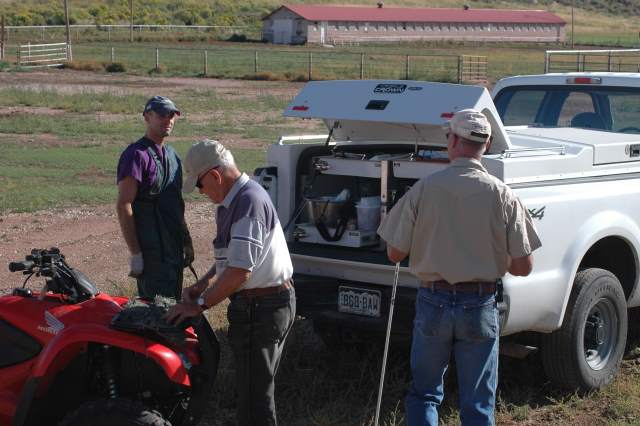September 16, 2015

With all of the media spin and paid-for activists, it can be too easy to think that consumers with questions about agriculture have a bone to pick.
Instead, lots of them are just interested.
“They just want to know more. They’ve been so far removed from agriculture that they’re fascinated by things we view as mundane,” says Jake Geis, DVM, at Tyndall Veterinary Clinic in Tyndall, South Dakota.
Since his days in veterinary school, Geis has taken a proactive approach to communicating with consumers, providing facts where fiction and rhetoric prevail. When he was still in vet school, he started writing a column along those lines for the college newspaper. He graduated from the Masters of Beef Advocacy (MBA) program. Now, he and his wife, Carolyn—a veterinarian in the same clinic—publish a blog (thecowdocs.com).
One of Geis’ widest-read posts so far is about tubing a calf. He couldn’t think about anything to write about—his self-imposed deadline for posting his weekly blog was nigh—so he just wrote about the last thing he’d done that day.
In retrospect, it’s easier to understand why that particular post drew such strong readership. It’s about something most know nothing about and would never think about. It demonstrates the lengths livestock producers go to in order to care for their stock. It’s completely transparent.
Geis simply described what he did, and how and why he did it. There was no defensiveness on his part. It wasn’t a response to an attack from the other side. He just offered folks who are interested a glimpse at something they know nothing about.
Geis emphasizes neither blogs nor other social media are required for effective advocacy.
“Work with the people around you,” Geis suggests. “Everyone in the world is only six degrees separated from everyone else. You can make a big difference in a small circle.”
It’s about informing consumers at the point of their concern, rather than defending. Consider how Geis took on a recent Consumer Reports column that suggested ground beef at grocery stores was routinely contaminated with antibiotic-resistant superbugs. In a block post titled, Are there superbugs in my beef, he writes:
“The first contentious part of this report is their definition of a superbug. Their idea of a superbug is bacteria that are resistant to more than one type of antibiotic. The problem with that definition is different species of bacteria are naturally resistant to different antibiotics. Think about it this way—the name bacteria correlates with an entire kingdom when you look at classifying organisms, exactly the same as the name plants does. Therefore, bacteria are as different from each other as pine trees are from bluegrass in your lawn.
“So when you spray your lawn with dandelion killer, the grass is naturally resistant to the spray. As a matter of fact, the grass is resistant to many different types of spray that kill dandelions. By Consumer Reports’ definition, that means bluegrass is a superplant.”
In the meantime, keep in mind the checkoff-funded MBA program—five courses that take about five hours to complete—are free. You can find an application here.
You might also like:
70 photos honor the hardworking cowboys on the ranch
Chipotle facing lawsuit for GMO-free claims
What's the best time to castrate calves? Vets agree the earlier the better
Basics and benefits of fixed time-AI
How to prevent & treat pinkeye In cattle
How to get more than a preg-check from the vets preg-check visit
You May Also Like



